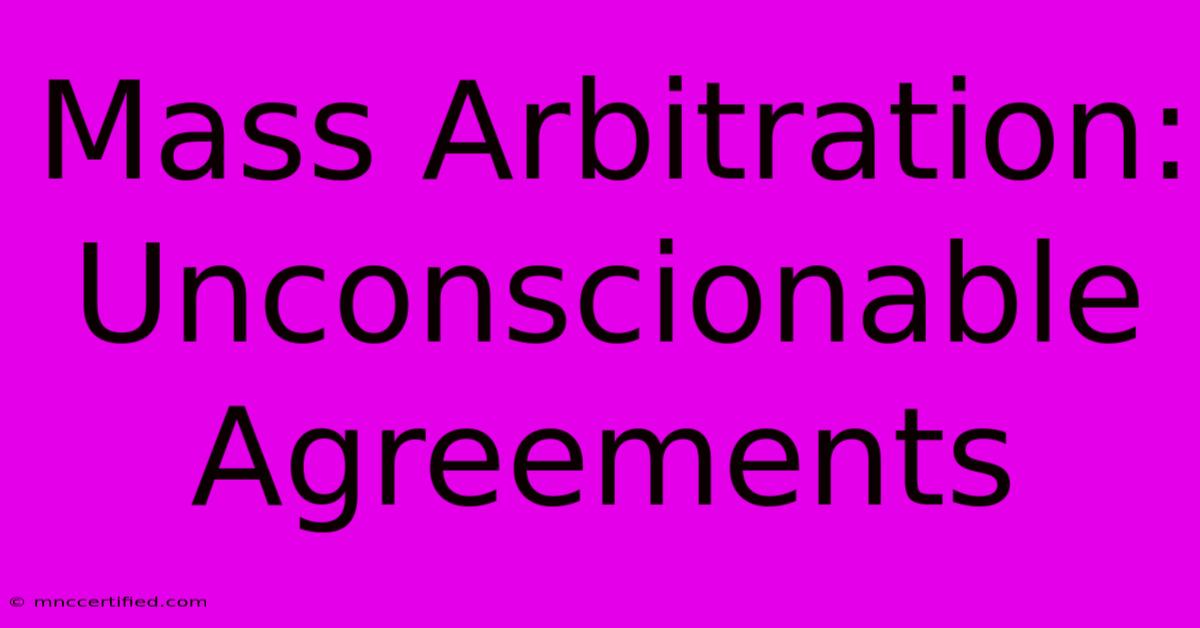Mass Arbitration: Unconscionable Agreements

Table of Contents
Mass Arbitration: Unconscionable Agreements – A Growing Concern
Mass arbitration, while presented as a streamlined method of dispute resolution, often hides a troubling reality: unconscionable agreements. This practice, increasingly prevalent in consumer contracts and employment agreements, allows companies to sidestep the traditional court system and force individuals into arbitration, often under terms heavily stacked against them. This article delves into the issues surrounding unconscionable mass arbitration agreements, examining their impact on consumer rights and exploring potential solutions.
Understanding Unconscionable Agreements
An unconscionable agreement is a contract so one-sided and unfair that a court of law will refuse to enforce it. Key characteristics include:
-
Procedural Unconscionability: This relates to the process by which the agreement was formed. Was it presented in a way that prevented meaningful negotiation? Was there a significant power imbalance between the parties? Think of fine print buried deep within lengthy contracts, presented in incomprehensible legal jargon, or presented as a "take it or leave it" proposition.
-
Substantive Unconscionability: This focuses on the terms of the agreement itself. Are the terms excessively harsh, unreasonable, or unfairly favorable to one party? Examples include clauses that severely limit remedies for the consumer, impose exorbitant arbitration fees, or prohibit class actions. This is often the crux of the issue in mass arbitration cases.
Mass Arbitration: The Systemic Problem
Mass arbitration agreements are particularly problematic because they often incorporate elements that exacerbate the inherent unfairness of unconscionable contracts. They frequently include:
-
Preclusion of Class Actions: This prevents individuals from banding together to pursue collective legal action, leaving them to fight expensive and often futile battles individually. This effectively discourages individuals from pursuing their rights, as the cost of individual arbitration often outweighs the potential recovery.
-
Arbitrator Selection Bias: Companies often have significant control over the selection process of the arbitrator, potentially leading to biased outcomes in their favor. This lack of neutrality undermines the fairness and integrity of the arbitration process.
-
Exorbitant Fees and Costs: Arbitration fees can be significantly higher than court costs, placing an undue burden on consumers and effectively preventing them from seeking redress. This barrier to entry further solidifies the imbalance of power.
The Impact on Consumers and Employees
The consequences of unconscionable mass arbitration agreements are far-reaching:
-
Reduced Accountability: Companies are less accountable for their actions knowing that individuals are unlikely to pursue individual arbitration due to cost and difficulty.
-
Erosion of Consumer Rights: Consumers are deprived of the protections afforded by class action lawsuits and the ability to collectively challenge unfair practices.
-
Increased Inequality: The system disproportionately harms vulnerable populations who lack the resources to navigate complex legal proceedings.
Challenging Unconscionable Agreements
While challenging these agreements can be difficult, several avenues exist:
-
State Laws: Some states have enacted legislation to curb the use of unconscionable arbitration clauses. Understanding your state’s specific laws is crucial.
-
Federal Courts: Challenges can be made in federal court based on grounds of unconscionability, focusing on both procedural and substantive issues.
-
Public Awareness and Advocacy: Raising public awareness about the prevalence and dangers of these agreements is essential to push for legislative and judicial reforms.
The Future of Mass Arbitration
The debate over mass arbitration and unconscionable agreements is far from over. Increased scrutiny from consumer protection agencies, legislative action, and ongoing legal challenges will likely shape the future of this controversial practice. Advocates for consumer rights are pushing for greater transparency, fairness, and accountability in the arbitration process, ultimately aiming to create a system that truly serves the interests of all parties involved, rather than favoring corporate interests.
Keywords: Mass arbitration, unconscionable agreements, arbitration clauses, consumer protection, class action waivers, arbitrator bias, unfair contract terms, dispute resolution, legal challenges, consumer rights, employee rights, procedural unconscionability, substantive unconscionability.

Thank you for visiting our website wich cover about Mass Arbitration: Unconscionable Agreements. We hope the information provided has been useful to you. Feel free to contact us if you have any questions or need further assistance. See you next time and dont miss to bookmark.
Featured Posts
-
Stream Barcelona Brest Champions League
Nov 27, 2024
-
Single Ticket Holds 7 4m Lotto Win
Nov 27, 2024
-
Dietician Covered By Insurance
Nov 27, 2024
-
Best Wildlife Photo Cast Your Vote
Nov 27, 2024
-
What Is Split Dollar Insurance
Nov 27, 2024